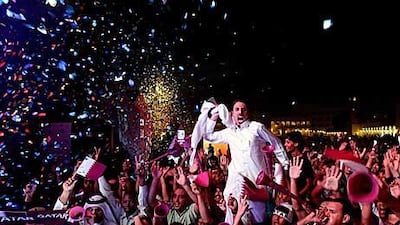ZURICH // Qatar will host the World Cup in 2022 after being chosen by football's ruling body yesterday as the first Middle Eastern country - and the smallest nation in history - to stage the event.
Amid scenes of great jubilation as the result was announced at a crowded exhibition centre in Zurich, the Gulf state was named ahead of the United States, Japan, Australia and South Korea.
The Qatari achievement was described as "a source of pride to all of us" by Sheikh Khalifa, President of the UAE, in a congratulatory call last night to Emir of Qatar, Sheikh Hamad bin Khalifa Al Thani.
Congratulations were also sent by Sheikh Mohammed bin Rashid, Vice President of the UAE and Ruler of Dubai, who described Qatar's win as "a win to all Arab countries and to the Arab and Middle Eastern sport in general".
Russia won the bitterly contested battle to present the 2018 tournament, a result that brought deep disappointment to England, which was eliminated in the first round of voting by the 22-man panel of the Fédération Internationale de Football Association (Fifa).
In choosing two countries that had never before staged a World Cup, Fifa demonstrated a clear resolve to spread the game more widely, a desire mirrored in the short but emotional acceptance speech from Sheikh Mohammed bin Hamad Al Thani, president of the Qatar bid.
"Thank you for believing in change," he said. "Thank you for believing the expanding the game.
“Thank you for giving Qatar a chance. We will not let you down. You will be proud of us, proud of the Middle East.”
The winning bid, which won high praise for its professionalism and passion, had the support of influential figures from the international games, including Zinedine Zidane, the son of Algerian immigrants who grew up to captain France.
Qatar obtained the necessary outright majority in a fourth round of voting, securing 14 votes compared with eight cast in favour of the United States, seen as its greatest rival. But in each of the previous rounds, Qatar had also topped the poll, showing consistent support for its submission.
To win Fifa’s confidence, Qatar had to overcome doubts about the ability of a Gulf state to run a successful sporting event in summer.
Members of the executive committee appear to have been impressed by the promise of high-technology solutions to ensure temperatures were limited to 27°C degrees in all 12 stadiums – nine still to be built – and at training facilities.
After the 2002 tournament, some of the structures will be dismantled and reassembled in developing countries to create a lasting legacy.
Qatar was also the target of critics who suggested it had reached a voting pact with Spain and Portugal, bidders for 2018. The allegations have been strenuously denied, though Fifa has acknowledged that holding the two votes on the same day raises the risk of collusion, and will not be repeated.
The importance attached by Qatar to winning the vote was demonstrated by the decision of the Emir, Sheikh Hamad bin Khalifa Al Thani, his wife, Sheikha Mozah, and the prime minister and foreign minister, Sheikh Hamad bin Jassim bin Jabor Al Thani, to fly to Zurich to support the bid team.
By contrast, the striking absence from Switzerland of the Russian prime minister Vladimir Putin, did no harm to his country’s chances.
Some observers had suggested his decision to stay away and to complain about “unscrupulous competition” were signs that he feared his country’s bid was faltering.
In fact, even disheartened members of the England bid team agreed the Russian bid had been outstanding. “Congratulations to Russia – they had a fantastic bid,” said Alan Shearer, the former England captain, now a BBC pundit, though he added: “It’s hard to swallow.”
Some critics had pointed to Russia’s need to start almost from scratch in building infrastructure, but Mr Putin’s government turned this to advantage, emphasising the greater legacy that would be left. For England, the pain of defeat was aggravated by the humiliation of finishing last among the four.
Despite sending its so-called “three lions” – David Cameron, the prime minister; Prince William, second in line to the English throne and David Beckham, the country’s best-known face of football – England obtained the support of only two Fifa executive committee members.
Russia received nine votes in the first round and, with England eliminated, 13 in round two, with Spain/Portugal attracting seven votes and the Netherlands/Belgium two.
England cannot now hope to host a World Cup before 2030 – which would be 64 years since it last did so – and the inquest has already started. Many fans blame the media for running stories alleging corrupt practices within Fifa, and the quality of national football administrators has also been called into question.
But even before the celebrations got under way in Doha and Moscow, one England supporter following events on the BBC website offered – an hour before the announcement – another view: “As much as I’d love to see it here, if Fifa wants to prove this is a global game and have a lasting effect worldwide, Russia and Qatar should be the hosts. It’s the World Cup, let’s take it around the world.”


